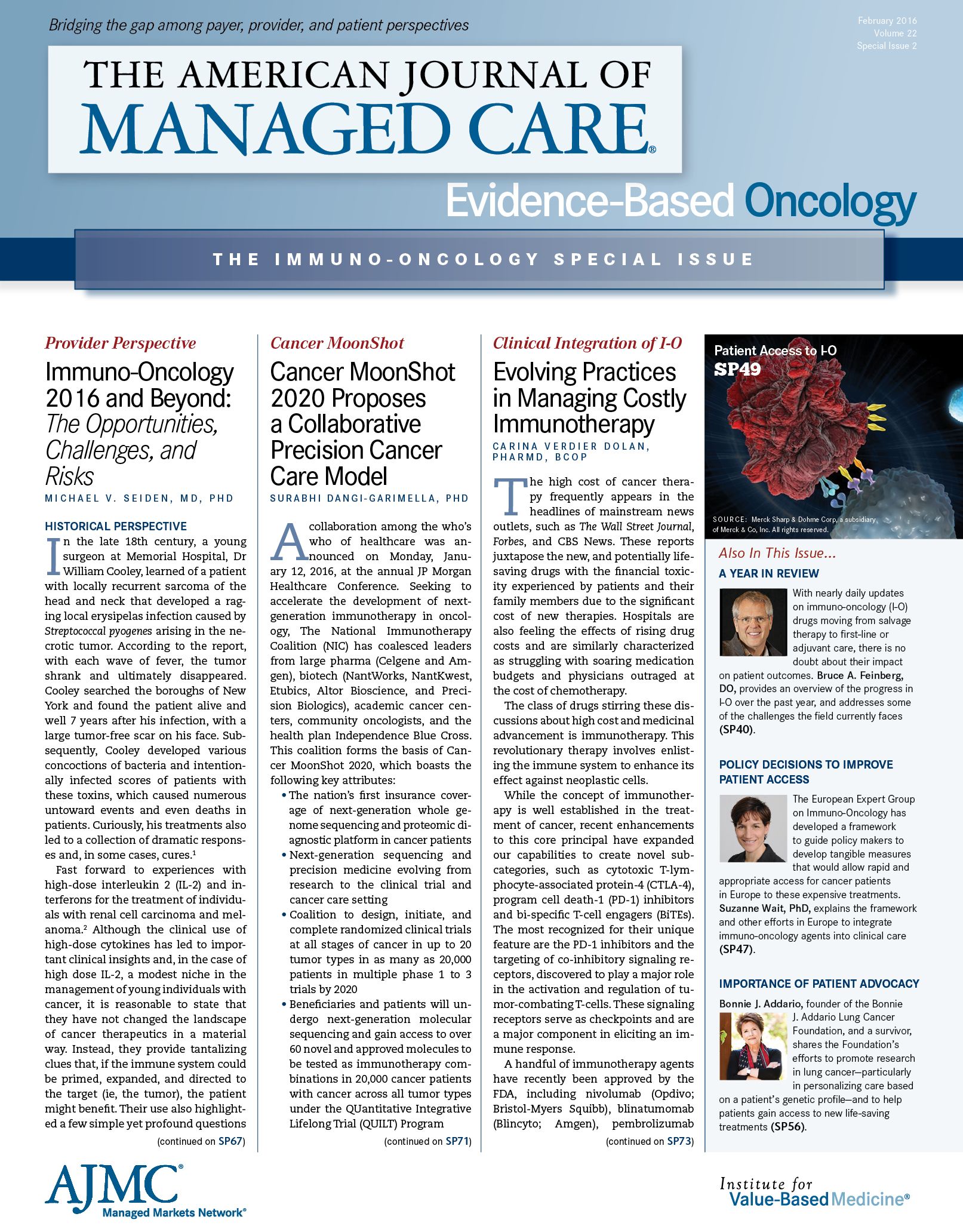- Center on Health Equity & Access
- Clinical
- Health Care Cost
- Health Care Delivery
- Insurance
- Policy
- Technology
- Value-Based Care
FDA Update in Oncology, February 2016
Carfilzomib, a proteasome inhibitor, has been approved by the FDA for use in combination with dexamethasone or lenalidomide, in patients with relapsed/refractory multiple myeloma who have previously received 1 to 3 lines of therapy.
Amgen’s Carfilzomib Approved for Multiple Myeloma
Carfilzomib, a proteasome inhibitor, has been approved by the FDA for use in combination with dexamethasone or lenalidomide, in patients with relapsed/refractory multiple myeloma (RRMM) who have previously received 1 to 3 lines of therapy.1 Also, the drug’s accelerated approval as a single agent has now been converted to a full approval—carfilzomib can be used alone in previously treated patients with RRMM.
The approval is based on phase 3 results of the ENDEAVOR study that were presented at the annual meeting of the American Society of Hematology2 and simultaneously published in Lancet Oncology. The randomized phase 3 study evaluated 929 adult patients with refractory multiple myeloma (RMM) who had received 1 to 3 prior lines of therapy. The study demonstrated that the doublet of carfilzomib and dexamethasone (Kd) significantly improved progressionfree survival (PFS) compared with bortezomib and dexamethasone (Vd) (median PFS, 18.7 vs 9.4 months; HR, 0.53; 95% CI, 0.44—0.65; P <.0001) in relapsed multiple myeloma. Bortezomib and dexamethasone are the current standard of care in multiple myeloma.
Grade 3 and greater adverse events (AEs) were significantly higher with Kd compared with Vd: 69.8% and 63.9%, respectively, in patients with 1 prior treatment, and 76.6% and 69.9%, respectively, in patients with at least 2 prior treatments. Grade 3 or higher hypertension, dyspnea, and cardiac failure were more common in the Kd group.
Now that the treatment is approved, cost will be the next big question for payers to develop coverage policies for the combination. Carfilzomib alone is estimated to cost $10,000 for a 28-day cycle in an average-sized patient.3 A recent health economic analysis of combination treatments commonly used in multiple myeloma by researchers at Novartis compared bortezomib plus dexamethasone; panobinostat, bortezomib, and dexamethasone; lenalidomide plus dexamethasone; lenalidomide, bortezomib, and dexamethasone; carfilzomib; carfilzomib, lenalidomide, and dexamethasone; and pomalidomide plus dexamethasone.4 The study examined the expenditures for drugs and their administration, for prophylaxis and adverse event monitoring, and for the treatment of grade 3 or 4 AEs.
carfilzomib
EBO
The authors concluded that the combination of , lenalidomide, and dexamethasone was the most expensive, because regimens that included lenalidomide were the most expensive (range was $126,000 to $256,000). The combination of bortezomib with dexamethasone and the combination of panobinostat, bortezomib, and dexamethasone, cost the least (less than $125,000). Quite importantly, the authors found that combining carfilzomib, lenalidomide, and dexamethasone incurred the highest medical costs. Since one of the regimens that has now been approved by the FDA is carfilzomib and dexamethasone, the safety and cost-effectiveness of this combination in the real world remains to be seen.
References
1. FDA approves new Kyprolis (carfilzomib) combination therapy for the treatment of patients with relapsed or refractory multiple myeloma [press release]. Thousand Oaks, CA: Amgen; January 21, 2016. http://www.amgen.com/media/ news-releases/2016/01/fda-approves-new-kyprolis-carfilzomib-combination-therapy-for-the-treatment-of-patientswith- relapsed-or-refractory-multiple-myeloma/.
2. Page MR, and Dangi-Garimella S. Novel combinations in multiple myeloma and lymphoma. The American Journal of Managed Care website. http://www.ajmc.com/conferences/ash15/-novel-combinations-in-multiple-myeloma-andlymphoma/ p-1. Published December 8, 2015. Accessed January 22, 2016.
3. Myeloma Beacon Staff. FDA approves Kyprolis (carfilzomib) for relapsed and refractory multiple myeloma. The Myeloma Beacon website. http://www.myelomabeacon.com/news/2012/07/20/fda-approves-kyprolis-carfilzomibfor- relapsed-and-refractory-multiple-myeloma/. Published July 20, 2012. Accessed January 22, 2016.
4. Roy A, Kish JK, Bloudek L, et al. Estimating the costs of therapy in patients with relapsed and/or refractory multiple myeloma: a model framework. Am Health Drug Benefits. 2015;8(4):204-215.

Telehealth Intervention by Pharmacists Collaboratively Enhances Hypertension Management and Outcomes
January 7th 2026Patient interaction and enhanced support with clinical pharmacists significantly improved pass rates for a measure of controlling blood pressure compared with usual care.
Read More

